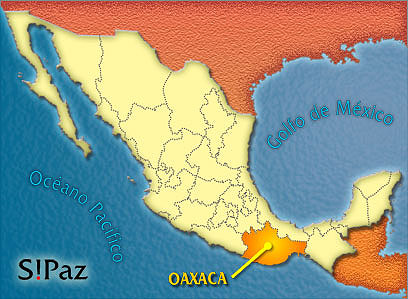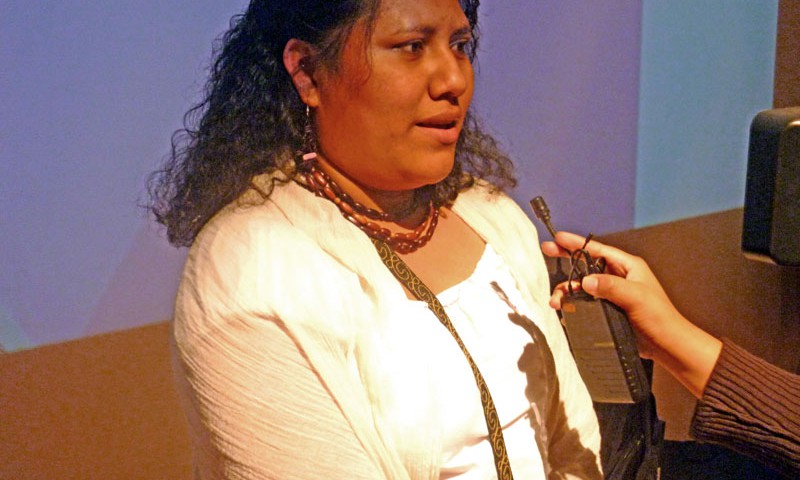PRESENCE OF MULTINATIONAL CORPORATIONS
06/02/2012
LOCATION
31/03/2012“I have lived my life with my head up and with much dignity, being who I am, proud of being a woman“.
On 1 October 2010, the Inter-American Court on Human Rights (IACHR) handed down two sentences against the Mexican State in the cases of Valentina Rosendo Cantú and Inés Fernández Ortega. In these cases the IACHR determined that both women had been raped and tortured by soldiers of the Mexican Army in the state of Guerrero, within a context of poverty, discrimination, and “institutional military violence” (Tlachinollan, 2011).
© SIPAZ
Valentina Rosendo Cantú denounces that on 16 February 2002 she found herself washing clothes in a river 200 meters from her home in the community Barranca Bejuco, Acatepec municipality, Guerrero, when eight soldiers appeared. Two of them asked her where the clandestines were. She responded that she didn’t know any of them. They demonstrated photos to her as well as a list of names, while one of them trained his firearm on her. They beat, assaulted, and tortured her, and at the end two of them raped her while the other six watched. In that moment Valentina, a Mee’pha indigenous woman, was 17 years of age and did not speak Spanish.
The case of Valentina is not an isolated case in Mexico. Many women suffer similar violations to their basic rights. For example, during the same year Inés Fernández Ortega, then 27 years of age, who is also Me’phaa, was threatened with death, beaten, and raped by three soldiers who entered her domicile in the Barranca Tecuani community, in the municipality Ayutla de Los Libres, Guerrero. Valentina and Inés did not guard their silence regarding these acts, but rather initiated a struggle to prevent the repetition of such abuses and outrages against women and to see to it that those responsible be punished and damages be compensated.
Due to the aggression, Valentina went to the Health Center of Caxaitepec, where, as she says, the doctor refused to attend to her because “he did not want problems with the soldiers.” She suffered similar discrimination and irregularities when she denounced the acts: “[…] they gave me no translator; they knew I did not speak Spanish well.” She says, “Not being silent has had serious consequences for me.” Following the denunciation, soldiers began to invade her community, and the mayor of Acatepec told her to stop being in conflict with the Army because if not the community authorities would not give her support for work and services. Her community as well as her husband rejected her, and it was for this reason that she moved to the city of Chilpancingo, having no house, and without knowing Spanish.”
For eight years the two women sought justice in Mexico, and during that time they and their relatives were the objects of death-threats, harassment, and surveillance. Valentina and her daughter Yenis have had to change residences several times.
The Official Recognition By The Mexican State
© SIPAZ
One part of the sentence dictated by the Inter-American Court in 2010 was that the Mexican State publicly apologize and recognize its responsibility, an act that after nine years took place in 2011. Alejandro Poiré, Secretary of Governance, publicly acknowledged the responsibility of the Mexican State in the case of Valentina and expressed his “most sincere apologies” for the happenings, “without referring to which type of public servants had violated Valentina’s rights.”
That recognition by the Mexican State represents an important step toward justice. Still there is much to do and to analyze in relation to the case. For example, Valentina laments that the Mexican State, by means of Poiré, continues to justify the arbitrary violations of human rights committed by public officials as “aberrations” and thus giving the impression that these violations and the impunity in the case are not a generalized practice in Calderón’s Mexico. “It is evident that these isolated cases do not in any way represent the policies of the Mexican State, oriented as they are at all times for the promotion, respect, protection, and guarantee of human rights.”
That day, Valentina came closer to her dream of obtaining justice, but she also knows that her struggle still has not ended: “No, not yet. It continues because those who are responsible are still free; they are not where they ought to be.” She knows this well because in her Me’phaa language justice is a word that comprises three ideas: apology, punishment, and reconciliation. What occurred on that day was only a step in the direction of justice. Impunity in the cases of Valentina and Inés as in those of thousands of other women in Mexico continues, and it signifies not only the lack of punishment of her aggressors, but also the lack of due process and investigation.
Regardless, Valentina has much hope that one day those responsible will be punished. She holds this same dream for all women who have suffered the same as her and who to date have not had the courage of confronting their attackers. She says: “Cases like mine are the hope for justice for many women—those women who could not be brave enough to oppose the government […]. I shared their pain, and the rage and courage they feel. To present a denunciation is not easy.” And for that it is important to encourage and aid other women in their efforts to continue struggling as she has, and as she will do until she finds justice and thus realizes her dreams: “I will never lock myself in a room or throw myself off a bridge. Never be silent: that is more painful than continuing to struggle.”

